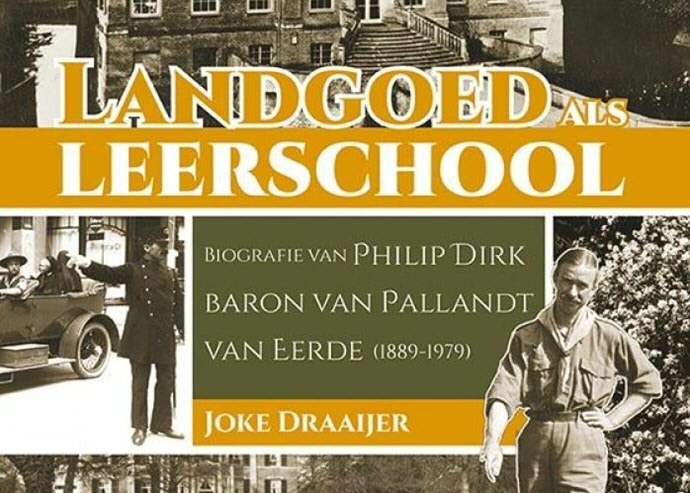Idealen die voortleven

Op 26 september zal Joke Draaijer promoveren op de biografie Landgoed als leerschool, Biografie van Philip Dirk baron van Pallandt van Eerde (1889-1979) waarmee ze bijdraagt aan de adelsgeschiedenis in Nederland. Ook maakt ze de ontwikkelingen inzichtelijker rondom de Orde van de Ster in het Oosten in Nederland, geleid door de Indiër Jiddu Krishnamurti, in relatie tot de hoofdpersoon van haar biografie. Promotores zijn prof. dr.Yme Kuiper en prof. dr. Mirjam de Baar.
Op haar 41e maakte Joke Draaijer een carriëreswitch: in 2001 startte zij met de studie Godsdienstwetenschap aan de Faculteit Godgeleerdheid en Godsdienstwetenschap, die zij in 2005 afrondde. ‘Ik koos voor Groningen omdat deze opleiding een afstudeerrichting Geestelijke Verzorging had. Deze richting heb ik uiteindelijk niet gevolgd omdat ik geïnteresseerd raakte in de kleine geloven in Nederland in het interbellum, en dan met name in de “Orde van de Ster in het Oosten” met de Indiër Jiddu Krishnamurti aan het hoofd. Van 2005 tot 2006 volgde ik de Onderzoeksmaster (toen nog Topmaster geheten) omdat ik een wetenschappelijke biografie wilde schrijven van Philip Dirk baron van Pallandt van Eerde (1889-1979). Wie onderzoek doet naar de Orde van de Ster komt als vanzelf met hem in aanraking.’
Religie en Biografie
‘De faculteit ging in de jaren erna van start met het onderzoeksprogramma Religie en Biografie,’ vervolgt Joke. ‘De trekkers waren prof. dr. Yme Kuiper en prof. dr. Mirjam de Baar. Kuiper heeft zijn sporen verdiend op het gebied van het adelsonderzoek, De Baar heeft een lijvige biografie (proefschrift) geschreven over Antoinette Bourignon. Zij werden mijn promotoren en mijn promotie zal op 26 september 2019 plaatsvinden. Mijn biografie van Philip Dirk baron van Pallandt van Eerde schetst een tijdsbeeld en is interessant vanwege bijvoorbeeld de woon- en leefcultuur van mensen van adel en ontwikkelingen rond adellijk grootgrondbezit in Nederland in de twintigste eeuw. In de biografie speelt de eerdergenoemde Krishnamurti een rol. Zijn “teachings” zijn anno nu nog altijd relevant.’
Inzichtelijker maken
‘Met mijn biografie getiteld Landgoed als leerschool, Biografie van Philip Dirk baron van Pallandt van Eerde (1889-1979) hoop ik bij te dragen aan de adelsgeschiedenis in Nederland en wil ik de ontwikkelingen rondom de Orde van de Ster in het Oosten in Nederland in relatie tot de hoofdpersoon van mijn biografie inzichtelijker maken. Ook is er veel aandacht voor het idealisme van de protagonist, die bestuurlijk actief was binnen onder meer de scouting, Natuurmonumenten en Vogelbescherming. Ik ga dieper in op zijn imago en zelfbeeld. Ook komen ontwikkelingen op het gebied van het natuurbehoud in Salland aan de orde.’
Landgoed als leerschool
Landgoed als leerschool is de eerste wetenschappelijke biografie over het leven van Philip Dirk baron van Pallandt en laat zien hoe hij de ingrijpende en dramatische ontwikkelingen die tijdens zijn leven plaatsvonden, verstond en verwerkte. Joke Draaijer licht toe: ‘Eerder is door anderen al wel aandacht geschonken aan delen van Van Pallandts leven, maar er is niet getracht het in context te plaatsen en er rode draden in te herkennen. Deze biografie, die aansluit bij het recente adelsonderzoek, beschrijft zijn lange leven aan de hand van vier thema’s en wil inzicht geven in de wijzen waarop de hoofdpersoon zich aanpaste aan veranderende omstandigheden in een groot deel van de twintigste eeuw. Philip omschreef zijn idealen zelf als een streven naar een broederschap. Een primaire rol zag hij daarbij weggelegd voor de scouting. Hij verspreidde het gedachtegoed van Baden Powell (de bedenker van de scouting) in Nederland en stelde zijn landgoed Eerde bij Ommen beschikbaar als trainingscentrum voor de Nederlandse scouts.’
Theosofie, de Orde van de Ster en Krishnamurti
‘Via de scouting kwam Philip in contact met idealistische jongeren. Een van hen introduceerde Philip in 1919 bij het bestuur van de Nederlandse afdeling van de Theosofische Vereniging. In datzelfde jaar ontmoette Philip in Londen de jonge, charismatische Indiër Jiddu Krishnamurti, die door de theosofen gezien werd als hun nieuwe wereldleraar. Krishnamurti gaf leiding aan de “Orde van de Ster in het Oosten”. De ontmoeting leidde ertoe dat Philip in 1924 al zijn bezittingen in Ommen weggaf aan de Eerde Foundation voor het werk van de nieuwe wereldleraar. Na de breuk van Krishnamurti met de Theosofische Vereniging en de Orde van de Ster in het Oosten gaf de Eerde Foundation in 1931 Philip zijn vroegere bezittingen terug, waarop hij besloot ze te verkopen aan natuurbeschermingsorganisaties.’
Idealen leven voort
Joke Draaijer: ‘Philips idealisme was gelaagd en veranderde in de loop van de tijd. In eerste instantie was het vooral gericht op een broederschap der mensheid. Later op de natuur en het behoud ervan. De rode draad in zijn idealisme vinden we in zijn inspanningen voor jongeren en sociaal zwakkeren. Op zijn landgoed Eerde maakte Philip zich definitief los van de oude, adellijke wereld van aristocratisch Den Haag. Hij stopte voorgoed met jagen en gaf de eeuwenoude bezittingen van de adellijke Van Pallandts weg – en kreeg ze later weer terug. De idealist stierf, maar zijn idealen leven voort op het huidige landgoed Eerde, waar nog altijd nazaten wonen en de activiteiten van de scouting, de internationale kostschool en het natuurbehoud tot op de dag van vandaag gecontinueerd worden.’
Promotie
Op 26 september zal Joke Draaijer tijdens een promotieceremonie haar proefschrift verdedigen in het bijzijn van haar promotoren prof. dr. Yme Kuiper, emeritus bijzonder hoogleraar Historische Antropologie en Antropologie van Religie aan de Faculteit Godgeleerdheid en Godsdienstwetenschap van de Rijksuniversiteit Groningen, tevens emeritus bijzonder hoogleraar Historische Buitenplaatsen en Landgoederen aan de Faculteit der Letteren van de RUG, en prof. dr. Mirjam de Baar, hoogleraar Cultuurgeschiedenis van het Christendom in de Vroegmoderne Tijd aan de Faculteit der Geesteswetenschappen van de Universiteit Leiden (tot maart 2016 bekleedde zij deze leerstoel aan de Faculteit Godgeleerdheid en Godsdienstwetenschap van de Rijksuniversiteit Groningen).
- Wanneer: Donderdag 26 september 2019
- Aanvang: 16:15
- Waar: Academiegebouw
Meer nieuws
-
06 januari 2026
Geschiedenis dichterbij brengen
-
10 juni 2025
RUG en Rijksmuseum tekenen samenwerkingsovereenkomst
